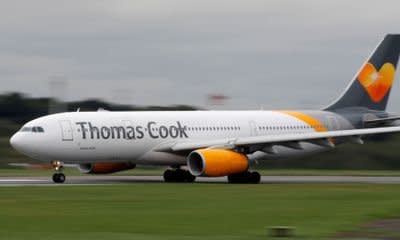Triton flies in with offer for Thomas Cook’s Nordic arm

One of Europe's largest buyout firms has approached Thomas Cook Group about a takeover of its Nordic airline and tour operator that could help the British company improve its fragile financial outlook.
Sky News has learnt that Triton, which bought the travel company Sunweb Group last December, is in talks with Thomas Cook about a deal.
Sources said on Thursday that the discussions were at an early stage, and cautioned that they might not result in an agreement.
If completed, the transaction being considered would see Thomas Cook offloading a business which holds market leading status - or close to it - in Denmark, Finland, Norway and Sweden.
The group's Nordic operations trade under the brands Ving, Tjareborg and Spies, and collectively employ roughly 20% of Thomas Cook's 21,000-strong workforce.
They serve about 1.5 million customers annually.
The precise valuation attached to a deal is unclear, although one insider said the sale of its Nordic airline and tour operator was likely to be worth "several hundred million pounds".
They insisted that Thomas Cook would only proceed with a deal if it enabled Thomas Cook to reduce its indebtedness and put its remaining operations in the UK and elsewhere on a more sustainable footing.
News of the approach from Triton comes five months after the buyout firm acquired Sunweb, which is jointly headquartered in the Netherlands and Switzerland.
It is unclear whether Triton would seek to combine Thomas Cook's business with Sunweb, although industry sources pointed out that Sunweb's chairman, Lars Lofgren, used to run the British company's Nordic business.
Thomas Cook and Triton both declined to comment on the talks, although they may come under pressure to confirm them from the City's takeovers watchdog.
If a deal is struck between the parties, it is expected to have an impact on other talks that are taking place between Thomas Cook and suitors for its remaining airline operations.
The company's shares have fluctuated wildly in the past week amid severe turbulence prompted by last week's £1.5bn half-year loss.
On Thursday, credit ratings agency Fitch downgraded Thomas Cook, warning that the company's current debt structure "provides it with little financial flexibility and leaves insufficient funds to develop the higher-margin own-hotel concepts and its online platform".
It comes just days after Sky News revealed that payment firms have been seeking to hold on to millions of pounds of customers' money owed to Thomas Cook - the UK's oldest and largest independent tour operator.
Its recent loss largely stemmed from a £1.1bn goodwill writedown relating to its 2007 merger with MyTravel.
Shares in the travel group have slumped by more than 90% during the last 12 months, and faced a further battering last Friday when analysts at Citi ascribed zero value to its equity.
EY, Thomas Cook's auditor, provided a going concern opinion on its accounts but warned that it faced "material uncertainty" without a deal to sell its airline business.
A new £300m winter debt facility - aimed at providing liquidity through the period when Thomas Cook's cash generation is at its annual low-point - has been offered by lenders, but only on the basis that it demonstrates progress selling the airline.
The company insists that that extra headroom will protect it in "a worst-case scenario".
Thomas Cook has become embroiled in an increasingly frantic bid to shore up confidence among consumers and lenders as it pointed to the absence of a Brexit deal's impact on customers' willingness to book overseas holidays during the crucial summer period.
Peter Fankhauser, chief executive, said the trading environment was "weak", and that "continued competitive pressure resulting from consumer uncertainty is putting further pressure on margins".
"This, combined with higher fuel and hotel costs, is creating further headwinds to our progress over the remainder of the year," he added.
Shares in Thomas Cook now stand at just 11.44p, giving its equity a value of only £187m.
People involved in talks about the future of Thomas Cook have, nevertheless, sought to downplay what they regarded as "irresponsible" suggestions that the company is at risk of collapse.
Prospective bidders, including Virgin Atlantic Airways, Lufthansa and Indigo Partners, a prominent aviation investor, are among those to have submitted non-binding offers for parts of Thomas Cook's airline business.
Talks about the airline sale are complicated by the need to strike a deal for Thomas Cook's holiday customers to travel on its planes.
Sky News revealed last month that the strategic review of Thomas Cook's airline had also triggered interest from prospective bidders for its tour operating business, as well as in the whole company.
Fosun, the Chinese owner of Club Med, has been steadily increasing its stake in Thomas Cook, which now stands at more than 18%.
However, EU regulations would prohibit a Chinese owner of Thomas Cook's airline.
The company is working with advisers from AlixPartners on its balance sheet and cost reduction plans, while its syndicate of more than a dozen lenders is being advised by FTI Consulting.
Last month, the company said it would close 21 high street shops and pare back its retail workforce as part of an attempt to exert a tighter grip on costs.
A much larger proportion of its 566-strong chain is likely to disappear in the coming years.
The entire sector is being ravaged by a brutal price war, while industry executives say uncertainty about the timing and nature of Brexit is prompting consumers to delay booking overseas holidays.

 Yahoo Finance
Yahoo Finance 